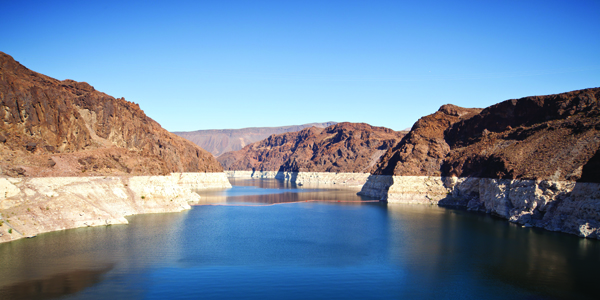Arizona’s water stewardship efforts received a major boost with an announcement by two water groups that they have achieved a $38 million funding goal to conserve 150,000 acre-feet of water (nearly 49 billion gallons) to shore up declining water levels in Lake Mead through the Colorado River Indian Tribes system conservation project.
The announcement was made by Business for Water Stewardship and the Environmental Defense Fund and represents the single-largest multi-sector collaborative drought response effort ever completed in Arizona.
Funding was made possible with the support of private sector businesses and foundations, including Intel Corp.; Google; Microsoft; Procter & Gamble; Reformation; Keurig Dr Pepper; Ecolab; Cascade; Cox; The Coca-Cola Foundation; Silk; Target; Brochu Walker; and Swire Coca-Cola, USA. Key Philanthropic funders included the Walton Family Foundation and Water Funder Initiative.
READ ALSO: Here’s how Valley utilities protect water supply amid rapid growth
“This partnership represents an important next step for Arizona’s water story: one where political leadership and the business and philanthropic communities come together to assure long-term water security for Arizona,” said Percy Kirk, Senior Vice President & Southwest Region Manager, Cox Communications. “We are proud to support the state’s efforts to plan for a sustainable future that preserves water for community, business and ecological uses.”
The news comes as the state nears an anticipated first-ever Tier 1 federal shortage declaration, with Arizona preparing for an 18% reduction in the amount of water it receives from Lake Mead and the Colorado River.
“How we use, manage, and value water will dictate our future,” said Todd Reeve, CEO of Bonneville Environmental Foundation and Co-Founder of Business for Water Stewardship. “Today is a major milestone made possible by collective impact. We’re redefining how businesses work collaboratively with tribes, community and policy stakeholders, philanthropy, and nonprofit partners to advance solutions that ensure that the people, economies, and ecosystems along the Colorado River have enough clean water to flourish.”
The funding announcement is a critical step in implementing the state’s forward-looking Drought Contingency Plan, in which Arizona and the six other Colorado River Basin States agreed to proactive water conservation actions to help prevent impacts associated with declining water levels in Lake Mead and Lake Powell. Arizona will likely face immediate water reductions in 2022 with the potential for deeper cuts in 2023.
The landmark funding partnership directly supports the Colorado River Indian Tribes and their extraordinary water conservation commitments to bolster water levels at Lake Mead.
“The importance of the DCP cannot be overstated as drought conditions persist,” said Amelia Flores, Chairwoman of the Colorado River Indian Tribes. “CRIT is proud to play a key role in mitigating water shortfalls facing Arizona. We are able to do so by careful conservation that benefits Arizona while protecting our water rights. The partnerships and alliances that have been forged across all levels of government as well as corporate and nonprofit entities demonstrate the level of commitment needed to solve this crisis.”
Recent collaborations among diverse corporate partners in Arizona show that businesses are leading the way with solutions and using their brands and tremendous capacity, influence and resources to pave the way for long-term water security in Arizona.
“Today’s announcement is the latest in a long history of Intel’s commitment to Arizona,” said Elizabeth Shipley, Director of Public Affairs for Intel in Arizona. “We’re proud of our investments in water conservation and commend the organizations supporting the CRIT system conservation project. Intel is committed to continuing to support projects and programs that benefit Arizona’s community, economy, and ecosystem as part of our goal to achieve net-positive water use by 2030.”
“Through our water positive commitment, Microsoft is focused on improving water conditions for people, nature, and society in water-stressed locations around the world,” said Paul Fleming, Microsoft Global Water Program Manager. “We’ve supported the CRIT project because of its tangible benefits to the community and because it has helped to coalesce and scale the activities of individual entities into a collective action framework. By aligning state government, tribal government, the non-profit and philanthropic communities, and the private sector, the CRIT project provides an example of how we can work together to steward a resource that sustains us all.”
Learn more at www.businessforwater.org.




